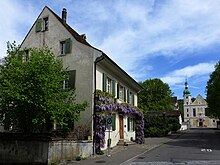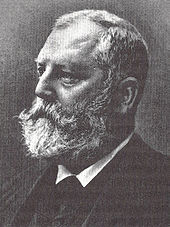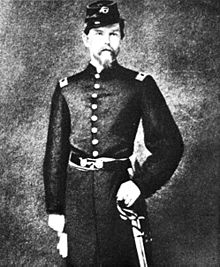Emil Frey
Emil Johann Rudolf Frey (born October 24, 1838 in Arlesheim ; † December 24, 1922 there , entitled to live in Münchenstein ) was a Swiss politician . Without a professional qualification, he moved to the United States in 1860 and volunteered in the Army of the Northern States at the beginning of the Civil War . He was a Confederate prisoner of war for a year and a half after the Battle of Gettysburg . Finally he returned to his homeland in 1865 as a war hero and began a career as a politician.
From 1866 to 1872 Frey was a member of the government council of the canton of Basel-Landschaft . From 1872 to 1882, and in 1890 he was the National Council , intervening ambassador of Switzerland in Washington, DC the end of 1890 he was as a representative of the radical faction (from 1894 FDP ) in the Federal Council elected, which he belonged to the 1897th His project to fundamentally reform the army failed in a referendum. He was then director of the International Telegraph Union (now the International Telecommunication Union ) until 1921 .
biography
Study and participation in the Civil War

He was the eldest son of the influential lawyer and politician Emil Remigius Frey . After the district schools in Therwil and Waldenburg , Frey completed the pedagogy in Basel and the boys' school in Ulm . Since he often came into conflict with teachers and school authorities, he did not receive a Matura certificate . Nevertheless, in 1855 he was able to begin studying agricultural sciences at the agricultural institute of the Friedrich Schiller University in Jena . He finished this in 1860 after several interruptions without a degree. In between he worked on Saxon manors and on his father's lease near Nuglar-St. Pantaleon in the canton of Solothurn . In December 1860 he moved to the United States in order in the state of Illinois , the farm economy meet.
When the Civil War broke out in April 1861 , Frey volunteered for service in the Northern Army . He was an ensign in the 24th Illinois Volunteer Infantry Regiment , commanded by Friedrich Hecker , a German Forty-Eighter . In the meantime he also recruited new recruits. After Hecker's transfer to the 82nd Illinois Infantry Regiment in October 1862, Frey, who had participated in all the campaigns and was promoted to major , succeeded his superior. During the Battle of Gettysburg in July 1863, he was captured by a unit of the Confederate Army . He spent the next year and a half as a prisoner of war in the infamous Libby Prison in Richmond, Virginia .
Politics and diplomacy
After the war, Frey, who had meanwhile become a Swiss-American citizen, returned to his homeland and was welcomed as a war hero. The district administrator of the canton of Basel-Landschaft appointed him land clerk in autumn 1865 . Six months later, in May 1866, he was elected to the government council . As a member of the cantonal government, he gained the reputation of a reformer and in a short time drafted several laws in the areas of schools, factory supervision, forestry and the church. In 1870 he married Emma Kloss, with whom he had five children; she died of tuberculosis in 1877 at the age of only 28 .
Frey renounced his government mandate in 1872 and worked in Basel as editor of the newspaper Basler Nachrichten , of which he was a co-owner. In the same he ran successfully in the National Council elections in 1872 . Within the large free-thinking parliamentary group in the National Council , he was one of the leading figures of the democratic current , which campaigned for the expansion of popular rights and a centralized state - concerns that were partially met with the total revision of the Federal Constitution of 1874. During the Kulturkampf , Frey fought vehemently against ultramontanism , which earned him the hostility of the Catholic conservatives. In the army he rose to the rank of colonel . In 1876 he was President of the National Council .
In 1882, the Federal Councilor appointed Frey as the first Swiss envoy in Washington, DC He felt this promotion was more like a political maneuver by the liberal center, which wanted to remove an uncomfortable politician in this way. As there were hardly any disputes between Switzerland and the United States, his diplomatic activity was limited to a minimum. He was mainly concerned with the welfare of the Swiss emigrants. He submitted a request to the Federal Council for a contribution of 10,000 francs towards the office costs of the Swiss legation. Frey's political opponents held an optional referendum against the corresponding federal decision . The contribution was rejected in the referendum on May 11, 1884 with 61.5% no votes. In 1888 Frey quit his post and started working as editor of the Basler Zeitung # National-Zeitung . In the National Council elections in 1890 he was re-elected as a member of parliament.
Frey was the official candidate for a vacant seat in the Federal Council as early as 1879 , but Wilhelm Hertenstein was chosen (with 92 to 63 votes). Two years later he was defeated again, this time with 95 to 75 votes. Another opportunity arose after Bernhard Hammer's resignation . The liberal center and the Catholic conservatives disagreed. Frey was elected to the state government in the first ballot on December 11, 1890, receiving 94 out of 181 votes. The Catholic-Conservative candidate Alois Kopp received 77 votes, another ten votes. While the National-Zeitung enthusiastically celebrated the election of its editor-in-chief, the Catholic-Conservative press complained about the "rape of the political minority by the all-powerful radicals".
Federal Council
At the beginning of 1891 Frey took over the military department from Walter Hauser , which he headed throughout his tenure. In 1894 he held the office of Federal President , but without changing to the Political Department , as was customary at the time, since Adrien Lachenal firmly claimed this for himself.
Frey was characterized by a wealth of ideas and a fast working style. However, his opponents accused him of trusting the advice of experts too much and that he was prone to vanity and urbane behavior. When, for example, after the autumn maneuvers in 1895, he had a four-in-hand drive to the seat of the city government of Lausanne , the press turned this event into a scandal. Under Frey's predecessors, the country's military readiness was neglected for reasons of cost. He implemented a comprehensive armaments program, which included an increase in ammunition stocks, the creation of food reserves and the construction of fortifications on the Gotthard Pass and near Saint-Maurice . He also fully equipped the infantry with the rifle in 1889 , created the army corps as the largest military unit and tightened the coordination of the executives.
Frey had less success with basic military templates than with organizational matters. He presented a federal resolution on the revision of the military articles of the Federal Constitution, which provided for greater centralization, the expansion of the military administration and the extensive renunciation of cantonal military sovereignty. A strong opposition formed against this project, which was particularly disturbed by his autocratic style of government and certain Prussian methods in training. Factual arguments increasingly faded into the background during the voting campaign. On November 3, 1895, the bill was rejected by the people with 58.0% no votes. Even more clearly, with 80.1% no votes, the federal law on disciplinary sanctions in the army failed on October 4, 1896.
further activities
At the Federal Council meeting on March 11, 1897, Frey announced his resignation at the end of the month, disappointed at the defeats. On the same day, his government colleagues elected him director of the International Telegraph Union (now the International Telecommunication Union ). Frey headed this international organization for almost a quarter of a century. He promoted the worldwide expansion of telegraph networks , and later also wireless radio telegraphy . As a close friend of Federal Councilors Ludwig Forrer and Ernst Brenner , Frey was always kept informed about what was going on in Swiss politics. In 1905 he published a treatise on the military history of Switzerland, which appeared under the title "The war deeds of the Swiss, told the people". For this, the University of Bern awarded him an honorary doctorate six years later . In 1921 he finally withdrew from the public eye.
Emil Frey was a member of the Freemasons ' Union , he was accepted into the Lodge on Friendship in Basel in 1872 . Max Leu created a bust of Frey.
Works
- From the experiences of a Swiss during the Civil War , Bern 1893.
- The wars of the Swiss, told to the people , Neuchâtel 1905.
literature
- Hans Rudolf Guggisberg : Emil Frey's unusual experience in America In: Basler Zeitschrift für Geschichte und Altertumskunde, Vol. 85, 1985, pp. 121-150
- Fritz Grieder: Emil Frey . In: Urs Altermatt (Ed.): Das Bundesratslexikon . NZZ Libro , Zurich 2019, ISBN 978-3-03810-218-2 , p. 193-199 .
Web links
- Fritz Grieder: Frey, Emil. In: Historical Lexicon of Switzerland .
- Emil Frey in the personal dictionary of the canton of Basel-Landschaft
- Emil Frey in the database Dodis the Diplomatic Documents of Switzerland
Individual evidence
- ↑ a b Grieder: The Federal Council Lexicon. P. 193.
- ^ Grieder: The Federal Council Lexicon. Pp. 193-194.
- ^ Grieder: The Federal Council Lexicon. P. 194.
- ↑ a b Grieder: The Federal Council Lexicon. P. 194.
- ^ Federal decree granting a contribution of 10,000 francs to the office costs of the Swiss legation in Washington , result of the vote of May 11, 1884 on admin.ch
- ^ Grieder: The Federal Council Lexicon. Pp. 194-195.
- ^ Grieder: The Federal Council Lexicon. P. 196.
- ^ Grieder: The Federal Council Lexicon. P. 197.
- ^ Federal resolution on the revision of the military articles of the Federal Constitution , result of the vote of November 3, 1895 on admin.ch
- ^ Federal law on disciplinary sanctions for the Federal Army , result of the vote of October 4, 1896 on admin.ch
- ^ Grieder: The Federal Council Lexicon. Pp. 197-198.
- ^ Eugen Lennhoff, Oskar Posner, Dieter A. Binder: Internationales Freemaurerlexikon , revised and expanded new edition of the edition from 1932, Munich 2003, 951 pages, ISBN 3-7766-2161-3
| predecessor | Office | successor |
|---|---|---|
| Bernhard Hammer |
Member of the Swiss Federal Council 1891–1897 |
Ernst Brenner |
| personal data | |
|---|---|
| SURNAME | Frey, Emil |
| ALTERNATIVE NAMES | Frey, Emil Johann Rudolf (full name) |
| BRIEF DESCRIPTION | Swiss politician |
| DATE OF BIRTH | October 24, 1838 |
| PLACE OF BIRTH | Arlesheim |
| DATE OF DEATH | December 24, 1922 |
| Place of death | Arlesheim |



